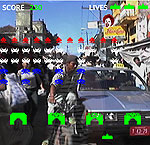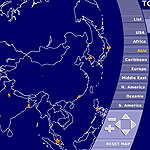:: Wednesday, July 20, 2005 ::
Editor's note: For the next couple of weeks, Eduardo Navas will be editing the Weeklies. Molly Hankwitz takes a much needed break. NAR thanks Molly for her great editing and write-ups. The focus for the next weeks will be on globalization and how online artists have taken on the complex subject. The following are not necesarily reviews, but rather recommendations with short snippets explaining why they are interesting, which include direct quotes by the artists or organizations.
A brief look at Art and Globalization
Edited by Eduardo Navas
How is Globalization affecting contemporary art practice? Some artists have tackled the subject head on by making Globalization a subject to critique in their works. The following projects are not all considered artworks, but what they all share is a focus on the problematics that Globalization has brought about in localities due to its consistent delivery of international interests, mainly by corporations. For this week we consider the work of two artists and two organizations,which will provide us with a small glimpse at the creative possibilities that emerging technologies bring about for those interested in taking a critical position.
The two artists are Erik Salvaggio and Ricardo Miranda Zuniga, the organizations are the Newseum and Identity and Globalization.  Salvaggio created a set of ascii pieces for turbulence in 2002, the project is titled American Internet, on which he writes: "While the Coca Cola logo is recognized as the symbol of American Commerce across the world; with only minor changes by region, there is another equivalent on the internet: ASCII; the universal standard for transmitting data via email and web sites. But while it is a universal standard, it is named after its country of origin- The American Standard Code for Information Interchange. While there are variants of ASCII in Cyrillic and in other scripts; it has only been recently that you can access a web site in, say, Japan, by actually typing with Japanese characters. While it has been expanded, it is still unpopular, and hasn't caught on with most international web surfers. Much like globalism at its worst, ASCII says to other systems, "You can have your own culture, see?" but threatens the existence of that culture through the pressure of economics. When in Korea, do what the Koreans do- search for a flower shop with English letters." Here Salvaggio is not only critiquing Coca-Cola but also reflecting upon the role of ascii as part of a particular homogenic power--American Culture--which dominates the international market due to English being the "universal" (default) language to communicate on the Internet.
Salvaggio created a set of ascii pieces for turbulence in 2002, the project is titled American Internet, on which he writes: "While the Coca Cola logo is recognized as the symbol of American Commerce across the world; with only minor changes by region, there is another equivalent on the internet: ASCII; the universal standard for transmitting data via email and web sites. But while it is a universal standard, it is named after its country of origin- The American Standard Code for Information Interchange. While there are variants of ASCII in Cyrillic and in other scripts; it has only been recently that you can access a web site in, say, Japan, by actually typing with Japanese characters. While it has been expanded, it is still unpopular, and hasn't caught on with most international web surfers. Much like globalism at its worst, ASCII says to other systems, "You can have your own culture, see?" but threatens the existence of that culture through the pressure of economics. When in Korea, do what the Koreans do- search for a flower shop with English letters." Here Salvaggio is not only critiquing Coca-Cola but also reflecting upon the role of ascii as part of a particular homogenic power--American Culture--which dominates the international market due to English being the "universal" (default) language to communicate on the Internet. Ricardo Miranda Zuniga appropriated the classic video game Space Invaders and added background images of Latin Americans who have been affected by the Free Trade Agreement to create Can an Economic System be a Dictator?. The introductory text is simple and to the point, it reads: " Space Invaders: Can an Economic System be a Dictator? The Free Market, a Cultural Invasion." The user gets to play Space Invaders very much how it is played in the classic game, only in this version the background images prove to be a bit distracting. Also, occasional figures like the monopoly man and "Chespirito" (a classic character from Mexican Television who is very popular throughout Latin America) show up to distract the player from killing off all the aliens. Here the idea of killing the invaders also is inevitably equated with the background images, which can be stereotyped as immigrants who enter the United States to find work.
Ricardo Miranda Zuniga appropriated the classic video game Space Invaders and added background images of Latin Americans who have been affected by the Free Trade Agreement to create Can an Economic System be a Dictator?. The introductory text is simple and to the point, it reads: " Space Invaders: Can an Economic System be a Dictator? The Free Market, a Cultural Invasion." The user gets to play Space Invaders very much how it is played in the classic game, only in this version the background images prove to be a bit distracting. Also, occasional figures like the monopoly man and "Chespirito" (a classic character from Mexican Television who is very popular throughout Latin America) show up to distract the player from killing off all the aliens. Here the idea of killing the invaders also is inevitably equated with the background images, which can be stereotyped as immigrants who enter the United States to find work. e-mail art is not much talked about, yet this is the foundation for the online resource called Identity and Globalization. In this project you can contribute your own image and text to a large database of artworks that are critical of globalization. Part of their context page reads: "In the same way as the utopic socialism was the response to the industrial revolution of the 19th Century, at the end of the 20th and the beginning of the 21st the anti-globalization movement confronts the system, which, since the political collapse of the Soviet block, exerts a world hegemony without comparison in the history of humankind: capitalism in its maximum expression."
e-mail art is not much talked about, yet this is the foundation for the online resource called Identity and Globalization. In this project you can contribute your own image and text to a large database of artworks that are critical of globalization. Part of their context page reads: "In the same way as the utopic socialism was the response to the industrial revolution of the 19th Century, at the end of the 20th and the beginning of the 21st the anti-globalization movement confronts the system, which, since the political collapse of the Soviet block, exerts a world hegemony without comparison in the history of humankind: capitalism in its maximum expression." Today, one can read just about any major newspaper online, but one does not necessarily get to see how the actual printed page looks on a particular day. This is now possible in a special interface created by the Newseum, an organization specializing in archiving newspaper frontpages from around the world. They explain, "Today's Front Pages is an online presentation of one of the Newseum's most popular exhibits. Every morning, more than 300 newspapers from around the world submit their front pages to the Newseum via the Internet. Sixty-eight of the front pages are selected for an outdoor exhibit located at Pennsylvania Avenue and Sixth Street in downtown Washington, D.C., future site of the Newseum. Front pages are chosen to represent each of the 50 states as well as a selection of other countries. The electronic files are printed out on large-format printers at the Newseum offices in Arlington, Va., and are then transported to the Pennsylvania Avenue site and mounted inside the 98-foot-long steel and Plexiglas display by 8:30 a.m., seven days a week."
Today, one can read just about any major newspaper online, but one does not necessarily get to see how the actual printed page looks on a particular day. This is now possible in a special interface created by the Newseum, an organization specializing in archiving newspaper frontpages from around the world. They explain, "Today's Front Pages is an online presentation of one of the Newseum's most popular exhibits. Every morning, more than 300 newspapers from around the world submit their front pages to the Newseum via the Internet. Sixty-eight of the front pages are selected for an outdoor exhibit located at Pennsylvania Avenue and Sixth Street in downtown Washington, D.C., future site of the Newseum. Front pages are chosen to represent each of the 50 states as well as a selection of other countries. The electronic files are printed out on large-format printers at the Newseum offices in Arlington, Va., and are then transported to the Pennsylvania Avenue site and mounted inside the 98-foot-long steel and Plexiglas display by 8:30 a.m., seven days a week."
What these projects show is that the very same tools used to expand the global market can be used to problematize, reflect and question the implications of the expansion of homogenic interests.